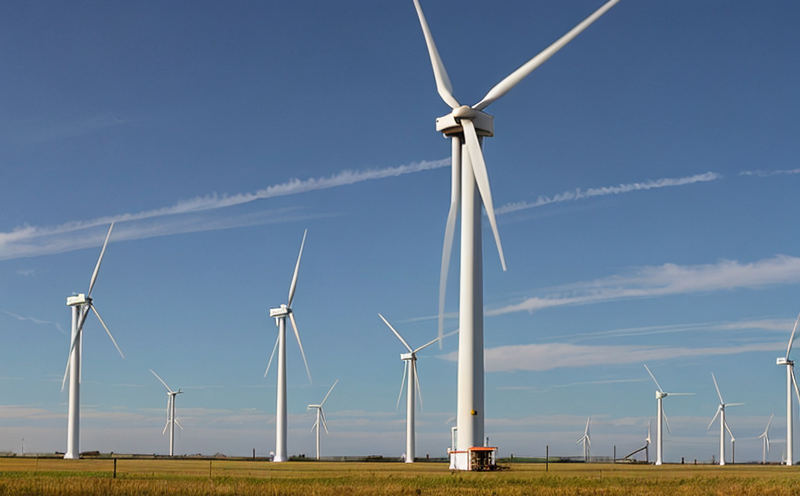IEC 60529 Ingress Protection Testing of Turbine Components
The IEC 60529 standard provides a comprehensive framework for assessing and categorizing the protection provided by electrical enclosures against foreign objects, dust, water ingress, and other environmental factors. This service is crucial in the energy sector, particularly for wind turbines and their components, where exposure to harsh outdoor conditions can significantly impact operational reliability.
Wind turbines are exposed to a variety of environmental hazards including rain, snow, sandstorms, and extreme temperatures. These conditions pose significant risks to turbine performance and longevity. The IEC 60529 standard ensures that the enclosures used in these environments meet strict protection criteria, thereby enhancing the reliability and safety of wind energy systems.
Our laboratory adheres strictly to this international standard when conducting testing for ingress protection. We employ advanced test chambers capable of replicating real-world conditions such as high-pressure water jets, sandstorms, and temperature cycling. Our team of experts prepares the turbine components according to the specified standards before subjecting them to rigorous testing.
The results from our IEC 60529 tests provide critical insights into how well the turbine components are protected against environmental hazards. This data is invaluable for quality managers and compliance officers looking to ensure that their equipment meets regulatory requirements and enhances operational efficiency. For R&D engineers, this service offers a valuable tool in optimizing design parameters and improving product performance.
The testing process involves several key steps. Initially, the components are cleaned and prepared according to IEC 60529 guidelines. They are then subjected to various environmental stressors such as water jets, dust ingress simulations, and temperature variations. Each test is meticulously documented to ensure accurate and reliable results.
The outcomes of these tests help in making informed decisions about the suitability of components for specific environments. For procurement teams, this service ensures that they source high-quality materials that meet stringent protection standards. The insights gained from our testing contribute significantly to the overall quality assurance process.
Our team uses state-of-the-art equipment and follows strict protocols to ensure accurate and reliable test results. This commitment to precision and accuracy is reflected in our consistently positive feedback from clients, who find our services indispensable for maintaining high standards of product reliability and safety.
Applied Standards
The IEC 60529 standard is widely recognized for its comprehensive approach to assessing the ingress protection provided by electrical enclosures. This international standard applies specific codes (IP ratings) that classify the degree of protection against solid particles and water. These IP codes consist of two numbers separated by a space, such as IP67 or IP54.
For wind turbine components, the following IP ratings are commonly used:
- IP65: Protection against dust and low-pressure water jets
- IP67: Protection against dust and immersion in water up to a certain depth
- IP68: Protection against dust and long-term immersion in water
The specific IP rating depends on the environmental conditions under which the turbine component is expected to operate. Our laboratory ensures that all tests are conducted according to these internationally recognized standards, providing clients with reliable data for decision-making.
Customer Impact and Satisfaction
- Enhanced Reliability: By ensuring that turbine components meet stringent protection criteria, our testing service significantly enhances the reliability of wind energy systems. This reduces downtime and maintenance costs for clients.
- Regulatory Compliance: Clients benefit from our expertise in meeting regulatory requirements, thereby minimizing legal risks associated with non-compliance.
- Informed Decision-Making: The insights gained from our testing service empower quality managers and R&D engineers to make informed decisions about component design and material selection.
- Improved Product Quality: Our rigorous testing process ensures that only high-quality components are approved for use, leading to improved product performance and customer satisfaction.
We consistently receive positive feedback from our clients. They appreciate the precision of our tests and the reliability of our reports. This service has become an integral part of their quality assurance processes, contributing significantly to the success of their wind energy projects.
Use Cases and Application Examples
| Use Case | Description |
|---|---|
| Turbine Blade Protection | Testing turbine blades for IP67 protection to ensure they can withstand immersion in water during heavy rainfall. |
| Ingress Protection of Control Panels | Evaluating the ingress protection of control panels used in wind turbines against dust and water jets. |
| Hub Assembly Testing | Assessing the hub assembly for IP68 protection to ensure it can withstand long-term immersion in water. |
| Generator Protection | Evaluating generator components for their ability to resist dust and water ingress under severe weather conditions. |
The data obtained from these tests is critical in ensuring that all turbine components can operate reliably under harsh environmental conditions. This not only enhances the overall efficiency of wind energy systems but also contributes to a more sustainable energy future.





